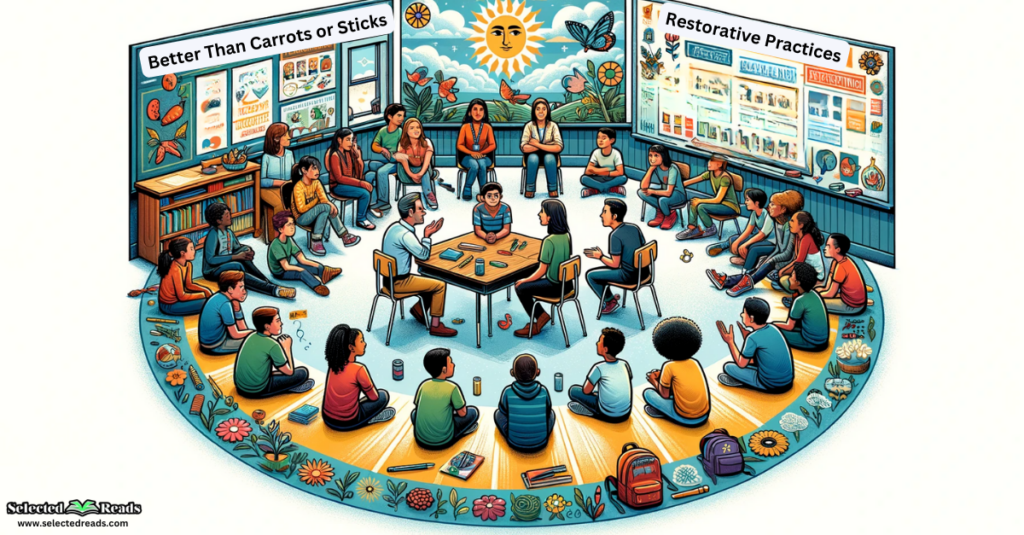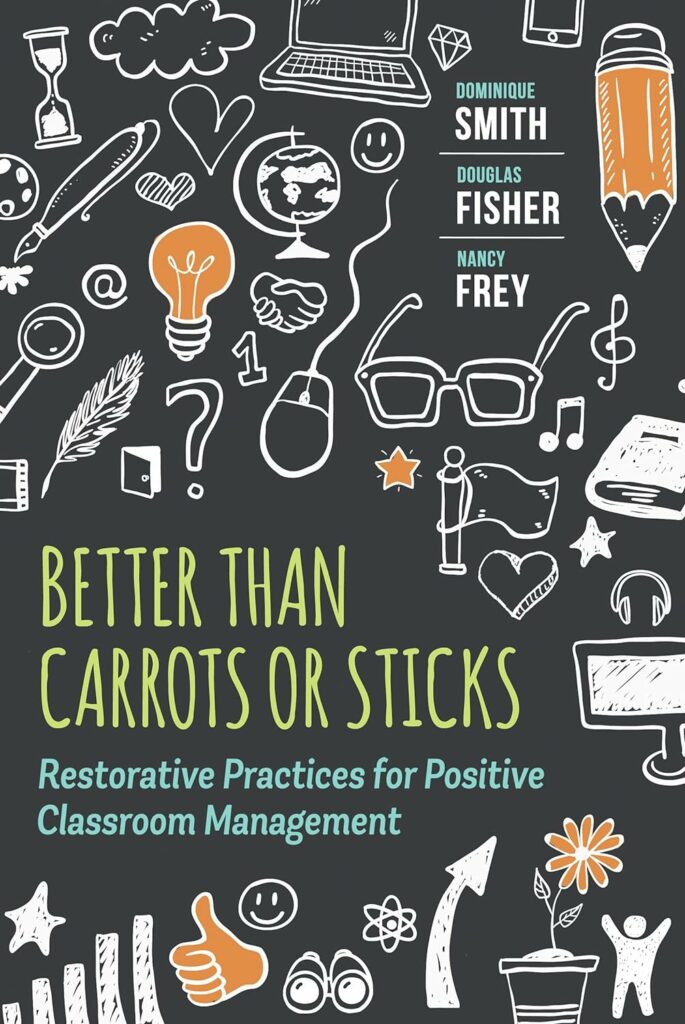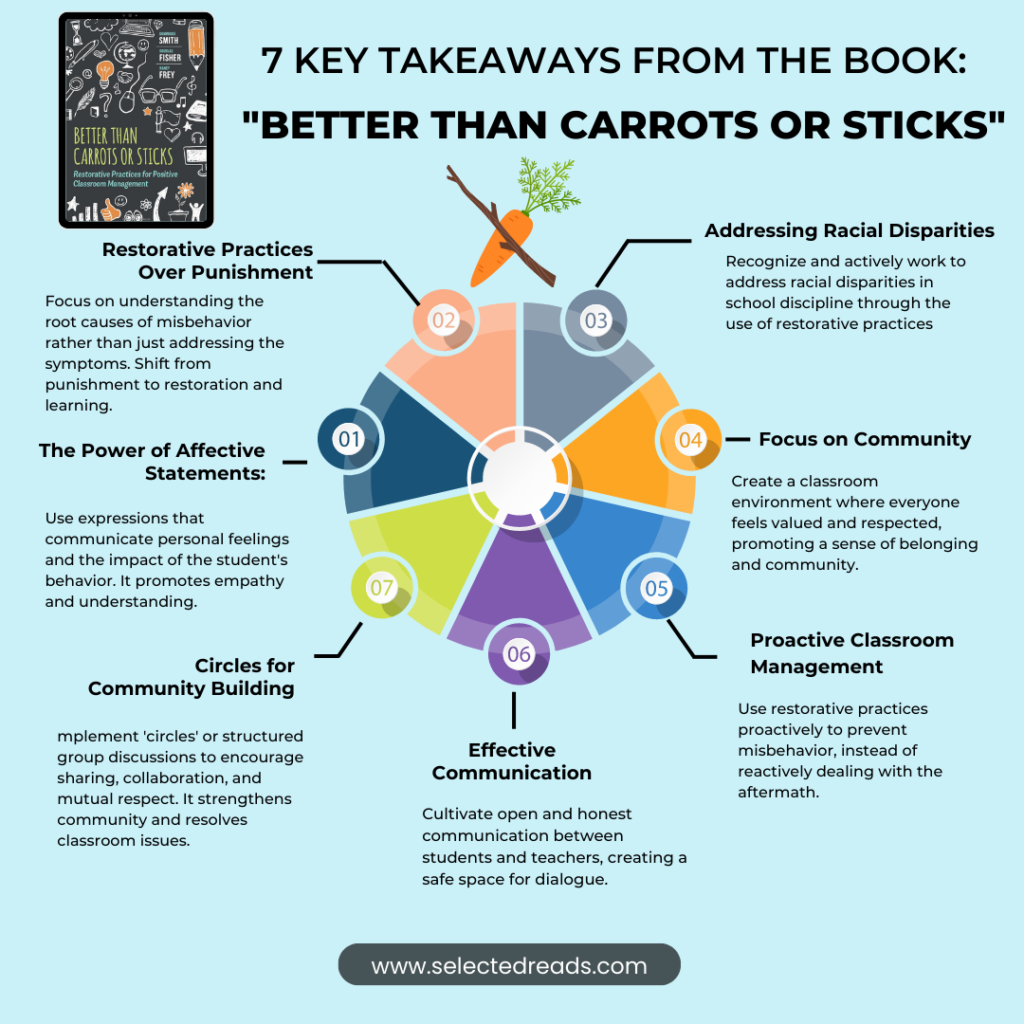In today’s post, our analytic focus is directed towards this amazing book by Dominique Smith, Douglas Fisher, and Nancy Frey titled “Better Than Carrots or Sticks: Restorative Practices for Positive Classroom Management.” At its core, this book is an invitation to rethink our methods of managing classroom behavior, advocating for a shift from the conventional carrot and stick approach towards a more empathetic, understanding, and community-focused strategy.
As an educator, I was drawn to the promise of restorative practices – a method that not only addresses behavior but also cultivates respect, responsibility, and positive relationships. Let’s discuss some of the main ideas advanced by the authors and extract main lessons to apply in our teaching practice.
What is a Restorative Practice in Classroom?
Before we delve into the content of the book, let’s first define what restorative practice in the classroom is all about. As outlined by future.ed.org, restorative practice, also known as positive discipline or responsive classroom, is a strategy aimed at nurturing a sense of community within the classroom.
This approach proactively promotes an environment of mutual respect and understanding, which helps in preventing conflicts. When issues do arise, it focuses on encouraging students to recognize and take responsibility for their actions, and to actively participate in the process of mending relationships.
This method shifts away from traditional punitive responses, emphasizing healing and learning instead. It’s about guiding students towards empathy, reflection, and making amends, thus creating a more inclusive and supportive educational setting.
Now, let’s move on to the summary of the book!
Better Than Carrots or Sticks Summary
“Better Than Carrots or Sticks: Restorative Practices for Positive Classroom Management” by Dominique Smith, Douglas Fisher, and Nancy Frey is an insightful book that lays out a transformative framework for managing classroom behavior and developing a nurturing, productive learning environment.
From my reading, it was evident that the book’s key premise revolves around the idea of ‘restorative practices’, a constructive method that replaces traditional punitive measures with a focus on understanding, communication, and community.
Photo: Amazon
The authors skillfully present a critique of the carrot and stick approach to discipline, suggesting that such methods may not be as effective as they are often thought to be. They argue that rewards (carrots) and punishments (sticks) fail to promote long-term behavioral changes, instead creating an external motivation that may not drive self-regulated behavior in students. This critique forms the basis of their argument for restorative practices, a discipline model centered on respect, responsibility, and the cultivation of positive relationships.
Smith, Fisher, and Frey illustrate how restorative practices can be effectively implemented at different levels – from one-on-one conversations to whole-school initiatives. These methods emphasize the importance of addressing the root causes of misbehavior rather than simply punishing the symptoms.
Better Than Carrots or Sticks provides a wealth of practical strategies and real-life examples of how restorative practices have been successfully used in various schools. The authors show how these practices can help reduce suspensions, expulsions, and office referrals while improving the overall school climate. They also highlight the important role that restorative practices can play in addressing the racial disparities in school discipline.
Another powerful takeaway was the idea of ‘fair process’, which involves engaging students in decision-making processes, explaining why decisions are made, and setting clear expectations. This principle not only promotes a sense of ownership and responsibility among students but also builds trust and respect.
The Four practices to establish a restorative classroom environment
Here are the four practices to establish a restorative classroom environment as conceptualized by the authors of. the book:
- Affective Statements and Questions: These are personal expressions of feeling in response to specific positive or negative student behaviors. Affective statements help students understand the real impact of their actions on others and promote empathy.
- Classroom Meetings: Regularly held gatherings that provide a forum for students and teachers to discuss class issues, celebrate successes, and plan for the future. These meetings foster a sense of community and shared responsibility.
- Informal Classroom Circles: An extension of classroom meetings where students and teachers sit in a circle to facilitate open communication, promote understanding, and address any issues in a non-threatening manner.
- Impromptu Conferences: Quick, in-the-moment conversations with students to address behavioral issues, clarify expectations, or provide feedback. These private conferences help to maintain the dignity of the student while effectively addressing the behavior.
These practices encourage a classroom culture that values open communication, empathy, mutual respect, and community building. They provide students with the opportunity to learn from their mistakes in a supportive and constructive environment, promoting positive behavior and academic success.
Related: 12 Best Classroom Management Books
Key takeaways from Better Than Carrots or Sticks
A printable PDF format of the poster below is available exclusively to our subscribers. Make sure you subscribe to download it.
Here are some key takeaways from “Better Than Carrots or Sticks”:
- Restorative Practices Over Punishment: Focus on understanding the root causes of misbehavior rather than just addressing the symptoms. Shift from punishment to restoration and learning.
- The Power of Affective Statements: Use expressions that communicate personal feelings and the impact of the student’s behavior. It promotes empathy and understanding.
- Circles for Community Building: Implement ‘circles’ or structured group discussions to encourage sharing, collaboration, and mutual respect. It strengthens community and resolves classroom issues.
- Engagement Through Fair Process: Involve students in decision-making processes, explain why decisions are made, and set clear expectations. This promotes ownership, responsibility, trust, and respect.
- Addressing Racial Disparities: Recognize and actively work to address racial disparities in school discipline through the use of restorative practices.
- Effective Communication: Cultivate open and honest communication between students and teachers, creating a safe space for dialogue.
- Relationships Are Central: Foster positive relationships within the classroom. This includes teacher-student and student-student relationships.
- Focus on Community: Create a classroom environment where everyone feels valued and respected, promoting a sense of belonging and community.
- Long-term Behavioral Changes: Understand that restorative practices help in developing self-regulation and long-term behavioral changes in students, unlike carrot and stick methods that promote external motivation.
- Proactive Classroom Management: Use restorative practices proactively to prevent misbehavior, instead of reactively dealing with the aftermath.
Final thoughts
In conclusion, Better Than Carrots or Sticks is a catalyst for change in the way we approach classroom management. Smith, Fisher, and Frey have not only critiqued traditional disciplinary methods but have also provided a practical, compassionate alternative that speaks to the heart of education. Their emphasis on understanding, communication, and community aligns perfectly with the needs of contemporary education.
This book doesn’t just offer strategies; it offers a new perspective on how we can shape our classrooms into spaces where every student feels valued, understood, and motivated to learn. Whether you’re a seasoned educator or a newcomer to the field, this book is an invaluable resource, offering insights and practical applications that can transform your approach to classroom management. Let’s embrace these restorative practices and create learning environments where students thrive not just academically, but also emotionally and socially.





